by Sukaina Ehdeed
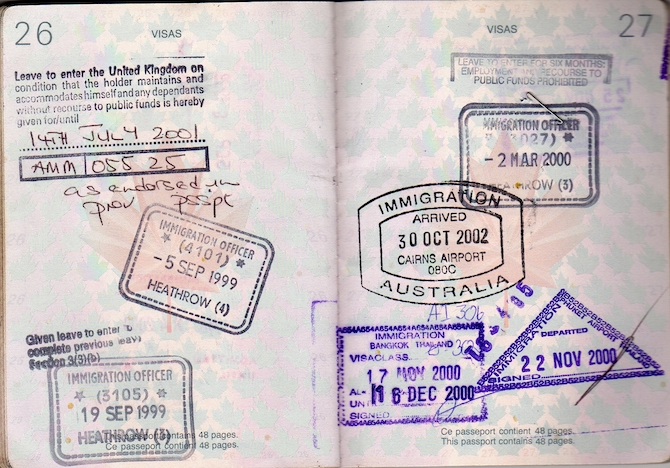
When your visa applications to attend academic conferences get routinely denied, you lose any enthusiasm for ever responding to a Call for Abstracts. The whole process becomes a waste of time and effort for yourself as well as your supervisors. The most recent visa rejection I experienced, which was a few weeks after completing my PhD, finally made me and my supervisors question the supposed commitments to diversity, freedom to learn and equality of opportunity in academic events. For the second time, the response from the High Commission of Canada was that they were ‘not satisfied that you will leave Canada at the end of your stay’. Although I was on a study permit at the University of Sheffield, with any travel expenses fully sponsored, I was denied a visa to present my PhD research at the 2019 Social Media and Society conference in Toronto – an annual gathering of leading social media researchers from around the world.
The High Commission of Canada had rejected my application on the same grounds the first time, meaning that I could not travel to Montréal to participate in the Doctoral Colloquium at AoIR2018, where I had been selected to receive the major travel scholarship worth US$1,500.
To be honest, I was confident when I first applied, having been told that the visa process in Canada was ‘easy’ and ‘friendly’. Unfortunately, this was not the case. Visa application fees and tickets are pricey and non-refundable. The speed of processing applications is also very slow. The Canadian visa department deliberated for three months only to deny my visa, and sent me the rejection letter three days after the event took place – a long time to be feeling anxious in the middle of your PhD studies.
Canada is not the only country where there are visa denials, delays and a discriminatory immigration policy. In 2017, I was accepted to participate at iConference 2017 in Wuhan, China. Again, I was not able to travel there because of visa requirements. This time I needed an ‘Invitation Letter of Duly Authorised Unit’ (in Chinese: 被授权单位邀请信)from Wuhan University so that the Chinese visa department in the UK could process my application. This letter differs from the usual conference invitation letters and it took a longer time to be issued. Exasperatingly, when I contacted Wuhan University to ask for it, they said that they could only provide me with the document if I applied in Libya, even though I had made it clear I was based in the UK. In fact, there is no Chinese embassy in Libya, with many countries having shut down their embassies in Libya since 2014 due to the escalating violence.
As a scholar from the MENA region, my visa troubles are relentless. This year I did not even bother submitting work to the iConference 2019, held in Washington, DC. The iConference is an important academic fixture in the Information Studies field, but is usually held in the US. Since I am a Libyan national I am affected by President Trump’s travel ban, which means nationals of seven countries (Iran, Libya, North Korea, Somalia, Syria, Venezuela and Yemen) are subject to various travel restrictions. Under this ban, which was put in place on 8 December 2017, there is no means through which I can get a visa for the purpose of attending a conference in the United States.
None of these conferences offered remote participation for those impacted by visa refusals, so the culmination of all these rejections means that I have been barred from all conferences in my field while studying for my PhD, with the current exception of those hosted in UK (one – iConference 2018 – at which I won the award for best poster).

Unlike citizens of the US and EU who are mostly granted visa free travel or, at least, have less complicated entry requirements, those who come from less developed countries or countries that have ongoing conflicts and instabilities are routinely impacted by discriminatory visa decisions. Hady Elsahar from Egypt was not able to travel to the US to attend the North American Association of Computational Linguistics (NAACL) conference because of visa delays. He further noted that scholars facing visa denials were less likely to receive travel funds from their institutions in the future without providing good reason.
Nasrin Mostafazadeh, from Iran, on the other hand could not leave the US as, due to the travel ban, she had been advised she would not be able to then return.
More recently, there have been similar issues reported with increased levels of visa refusals from the UK government. The Home Office has been accused of institutional racism and discrimination for refusing visas to visiting academics from Africa and the Middle East. In 2019, it was reported that UK visa refusals were issued at twice the rate for African visitors than for those from anywhere else in the world. The British Parliament is now calling for an investigation into the visa process.
The Canadian Association of African Studies (CAAS) has also warned that African academics seeking to speak at conferences in Canada are increasingly facing more visa delays and refusals. CAAS has documented a pattern of continuing discriminatory visa decisions for academics applying for knowledge exchange programmes and to interact with like-minded scholars and researchers. The key issue highlighted by CAAS is the Canadian authorities’ belief that African academics will not leave Canada at the end of their stay, despite the provision of all required visa documents. This is echoed in my personal experience.
Visa refusals can be a very distressing experience, especially for emerging researchers for whom academic conferences and meetings are important opportunities to share their work, increase their visibility, and meet with other researchers in their field. Visa restrictions remove these opportunities for learning and networking, contributing to the further marginalisation of under-represented voices within the academic community. Visa refusals are not only a missed opportunity for the researchers impacted, but also for the academic community as a whole who would benefit from more diverse inputs into conference discussions. This should be a matter of concern for all. Rather than losing out on cutting-edge scholarship, universities need to lobby their respective governments for better management of the visa application process, and in the meantime conference organisers and host universities need to find ways to enable those impacted by visa rejection to participate remotely.


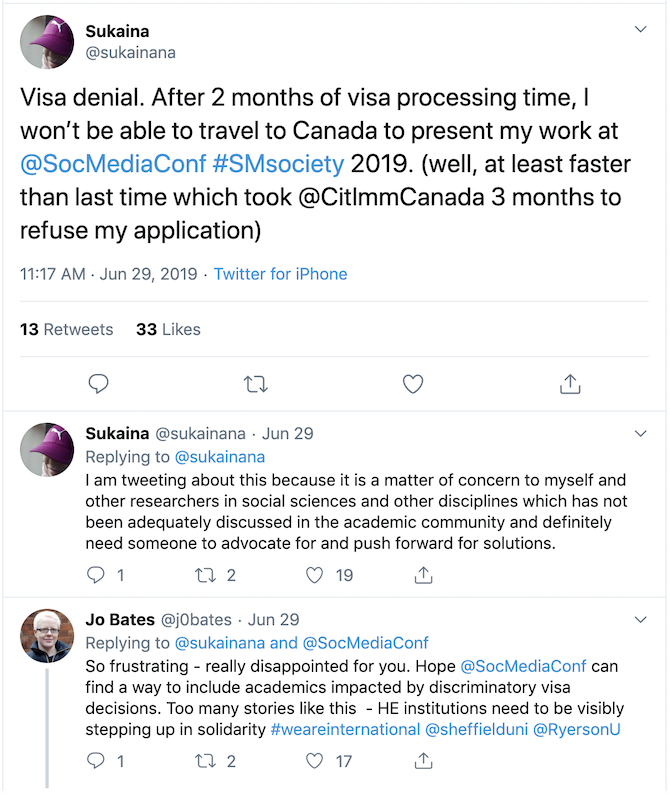
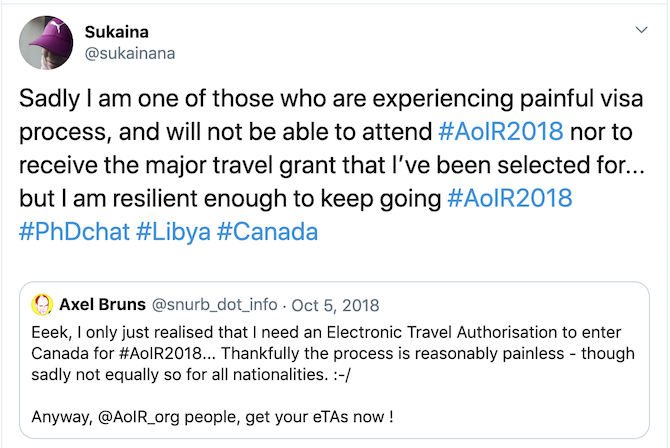
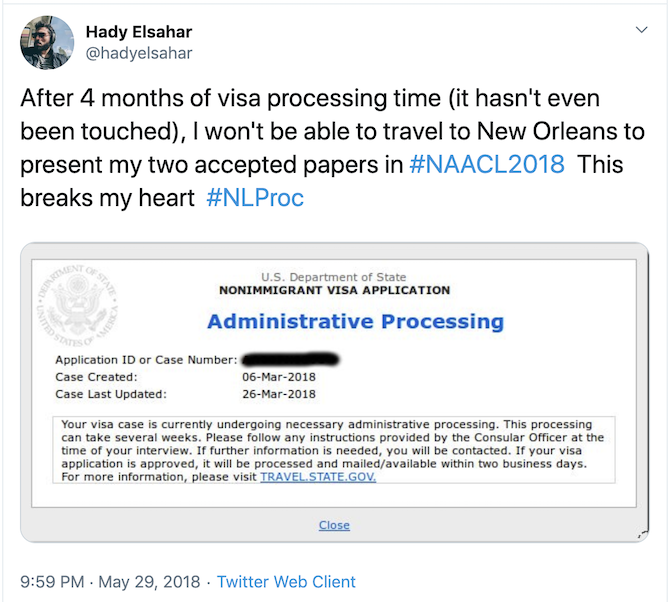
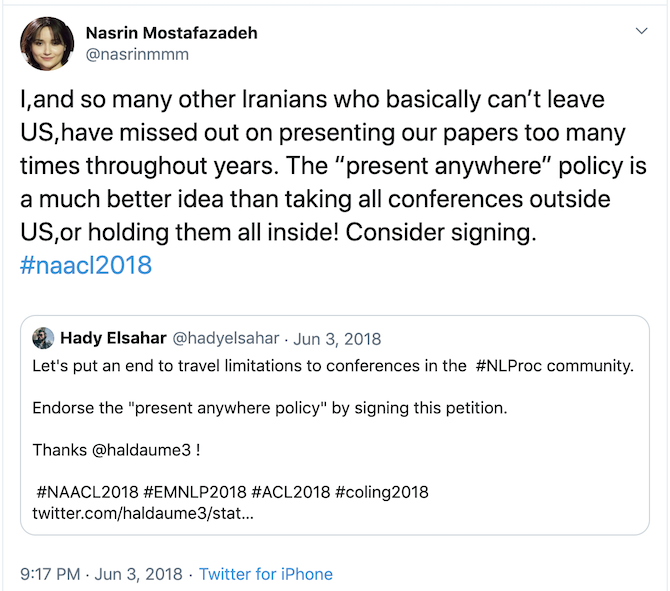


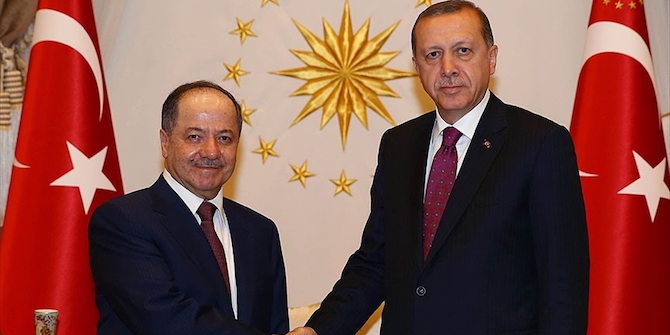


What happens to them with Africa and the Middle East, it is known that they are countries with a bit of conflict, but not all are of the same line, those who wish to prosper abroad should be considered, studies in North America, such as the European Union They are the best, why deny them a visa?
I have several times had trouble getting African scholars visas to participate in conferences. I always tell African invitees to applly early so we can appeal. It is not just Canada or the US. In one case, a distinguised Nigerian literary scholar was told he had to be interviewed, and was assigned by the Italian embassy an interview date after the conference began. He fumed that Nigerian prostitutes and drug dealers could get into Italy, but not the chair of the English department at a leading university. Many countries participate in these racist practices. Also, many years ago, a Senegalese friend applied to graduate school in Canada. He was admitted, but it took him over a month to arrange travel. When he arrived, he was denied entry because the one month via had expired. He did not have the funds to try again and had to develop a different career. He already had one Canadian degree and should have trusted. Ironically, all of his children have done university degrees in Canada.
The University of Toronto is considered the best in Canada and is ranked 31st worldwide. Created in 1827, it has about 88,700 students at its three campuses in Toronto, and is recognized for its research innovation programs, such as those linked to the finding of insulin and stem cells.
It costs so much paper to get the eta Canada .. I found a place where they process it in minimum time
https://etacanada.com.mx/